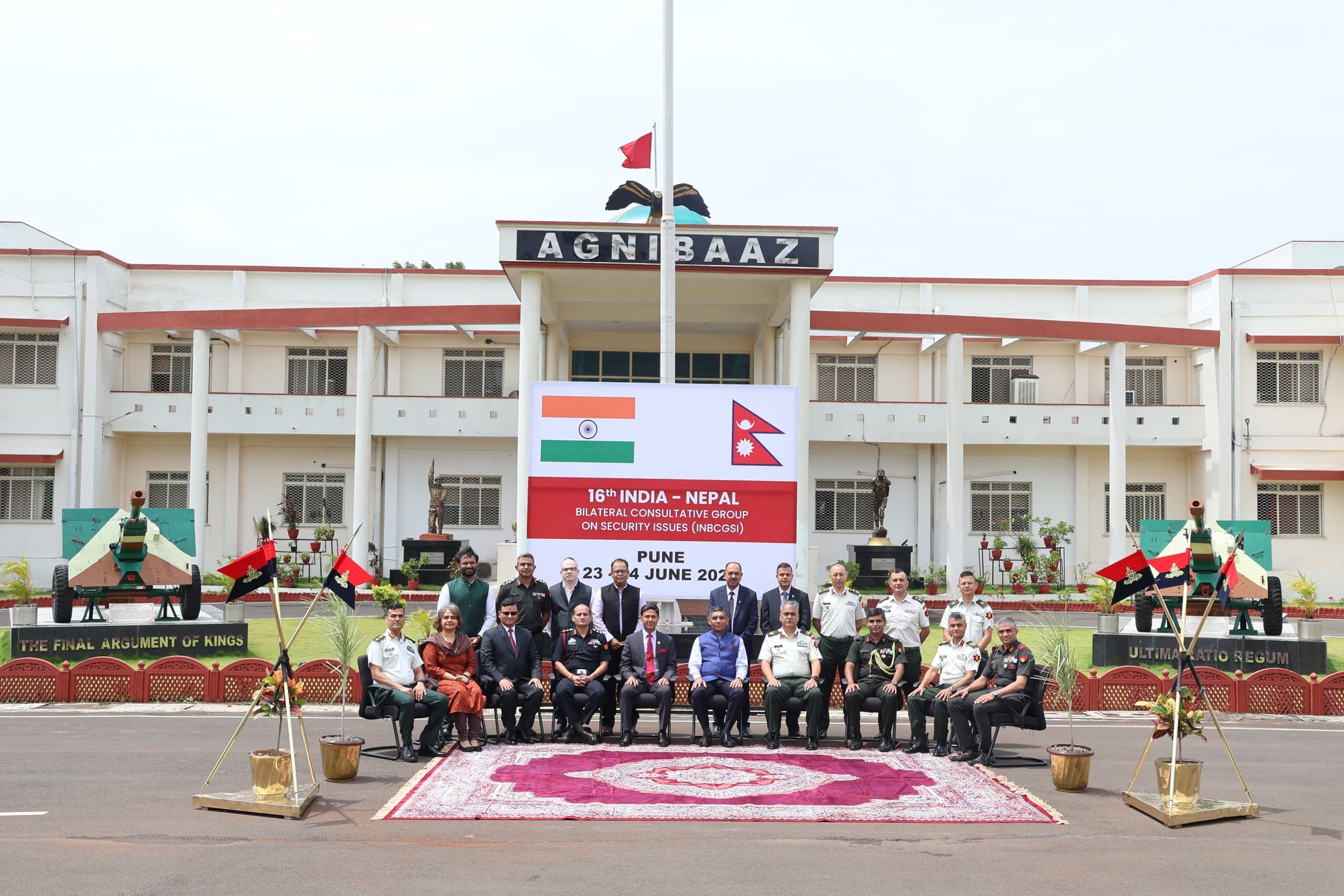India-Nepal Security Dialogue Amid Regional Turmoil Marks Strategic Deepening of Bilateral Ties

Pune — In a period marked by heightened global and regional tension—including the aftermath of U.S. airstrikes on Iran and renewed hostilities between India and Pakistan—India and Nepal convened for their Sixteenth Meeting of the Bilateral Consultative Group on Security Issues (INBCGSI). The two-day meeting, held in Pune from June 23 to 24, 2025, was a notable assertion of strategic alignment and regional cooperation between the two long-standing neighbors.
The Indian delegation was led by Shri Munu Mahawar, Additional Secretary (North), Ministry of External Affairs, while the Nepali side was headed by Mr. Gahendra Rajbhandari, Joint Secretary (South Asia), Ministry of Foreign Affairs. Officials from both countries’ foreign and defense ministries, as well as senior military representatives, participated in the dialogue.
In light of recent geopolitical turbulence, particularly the rapid escalation of military activity in the Middle East and the threat of destabilization spreading through South Asia, this dialogue carried more weight than ever before. As the Iran-Israel conflict rattles global markets and security frameworks, and as India continues to manage its sensitive border dynamics with Pakistan, the reaffirmation of India-Nepal security cooperation signals a stable axis within an increasingly volatile region.
Discussions between the two delegations were substantive and forward-looking. They covered a wide range of topics including military training, defense equipment supply, joint disaster relief operations, and the expansion of joint military exercises. The exchange also involved on-site visits to both public and private defense manufacturing hubs in Pune to explore opportunities for defense industrial collaboration.
The significance of this meeting was further underlined by India’s "Neighbourhood First" policy in action. On June 24, India evacuated two Nepali nationals along with 281 Indian and 3 Sri Lankan citizens from Iran under #OperationSindhu, a high-stakes humanitarian effort amid the ongoing Middle East conflict. Minister of State for External Affairs Pabitra Margherita received the evacuees in New Delhi, reinforcing India's regional commitment not just in words but in action.
The Embassy of India in Kathmandu highlighted the evacuation as a symbol of the enduring India-Nepal friendship, tweeting:
“🇮🇳’s Neighbourhood First policy in Action. Reflecting the spirit of longstanding 🇮🇳🇳🇵 friendship, India safely evacuated two Nepali nationals from Iran under #OperationSindhu.”
With more than 2,500 Indian nationals already evacuated, this act of cross-border solidarity has not gone unnoticed in Kathmandu. In the backdrop of regional uncertainty, these developments reaffirm India’s pivotal role as a reliable partner in times of crisis—not just for its own citizens, but also for its neighbors.
The INBCGSI platform, established in 2003, has served as the institutional backbone for bilateral defense consultations. However, the 2025 meeting appears to have added urgency and strategic depth. Amid fears of broader conflict and increasing cyber, conventional, and proxy threats, the emphasis on integrated responses, equipment modernization, and joint military preparedness marks a notable shift from symbolic diplomacy to actionable strategy.
In an era of global fragmentation and rising ideological confrontations, India and Nepal’s reaffirmed commitment to defense cooperation is more than a bilateral gesture—it is a stabilizing signal in an increasingly unpredictable geopolitical climate.
As regional rivalries simmer and the world grapples with new alignments, the deepening of India-Nepal security ties provides both countries with a critical axis of coordination—rooted in geography, reinforced by history, and now shaped by shared strategic necessity.




![From Kathmandu to the World: How Excel Students Are Winning Big [Admission Open]](https://nepalaaja.com/img/70194/medium/excel-college-info-eng-nep-2342.jpg)
